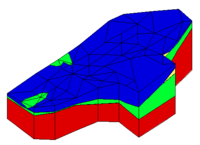GMS:Solid Module: Difference between revisions
From XMS Wiki
Jump to navigationJump to search
No edit summary |
No edit summary |
||
| Line 1: | Line 1: | ||
{{Solid links}} | {{Solid links}} | ||
{{only in print| | {{only in print| | ||
[[Image:solids.gif|left|frame|Example of a solid created in GMS| | [[Image:solids.gif|left|frame|Example of a solid created in GMS|250px]] | ||
[[Image:xsect.gif| | [[Image:xsect.gif|center|frame|Example of fence diagrams created using solids|250px]]}} | ||
The Solid module of GMS is used to construct three-dimensional models of stratigraphy using solids. Once such a model is created, cross sections can be cut anywhere on the model to create fence diagrams. | The Solid module of GMS is used to construct three-dimensional models of stratigraphy using solids. Once such a model is created, cross sections can be cut anywhere on the model to create fence diagrams. | ||
{{hide in print| | {{hide in print| | ||
Revision as of 18:04, 23 June 2011
Solids are used for site characterization and visualization. Solids can also be used to define layer elevation data for MODFLOW models using the Solids -> MODFLOW command or Solids to HUF and to define a layered 3D mesh using the Solids -> Layered Mesh.
| [hide] GMS – Groundwater Modeling System | ||
|---|---|---|
| Modules: | 2D Grid • 2D Mesh • 2D Scatter Point • 3D Grid • 3D Mesh • 3D Scatter Point • Boreholes • GIS • Map • Solid • TINs • UGrids | |
| Models: | FEFLOW • FEMWATER • HydroGeoSphere • MODAEM • MODFLOW • MODPATH • mod-PATH3DU • MT3DMS • MT3D-USGS • PEST • PHT3D • RT3D • SEAM3D • SEAWAT • SEEP2D • T-PROGS • ZONEBUDGET | |
| Aquaveo | ||
